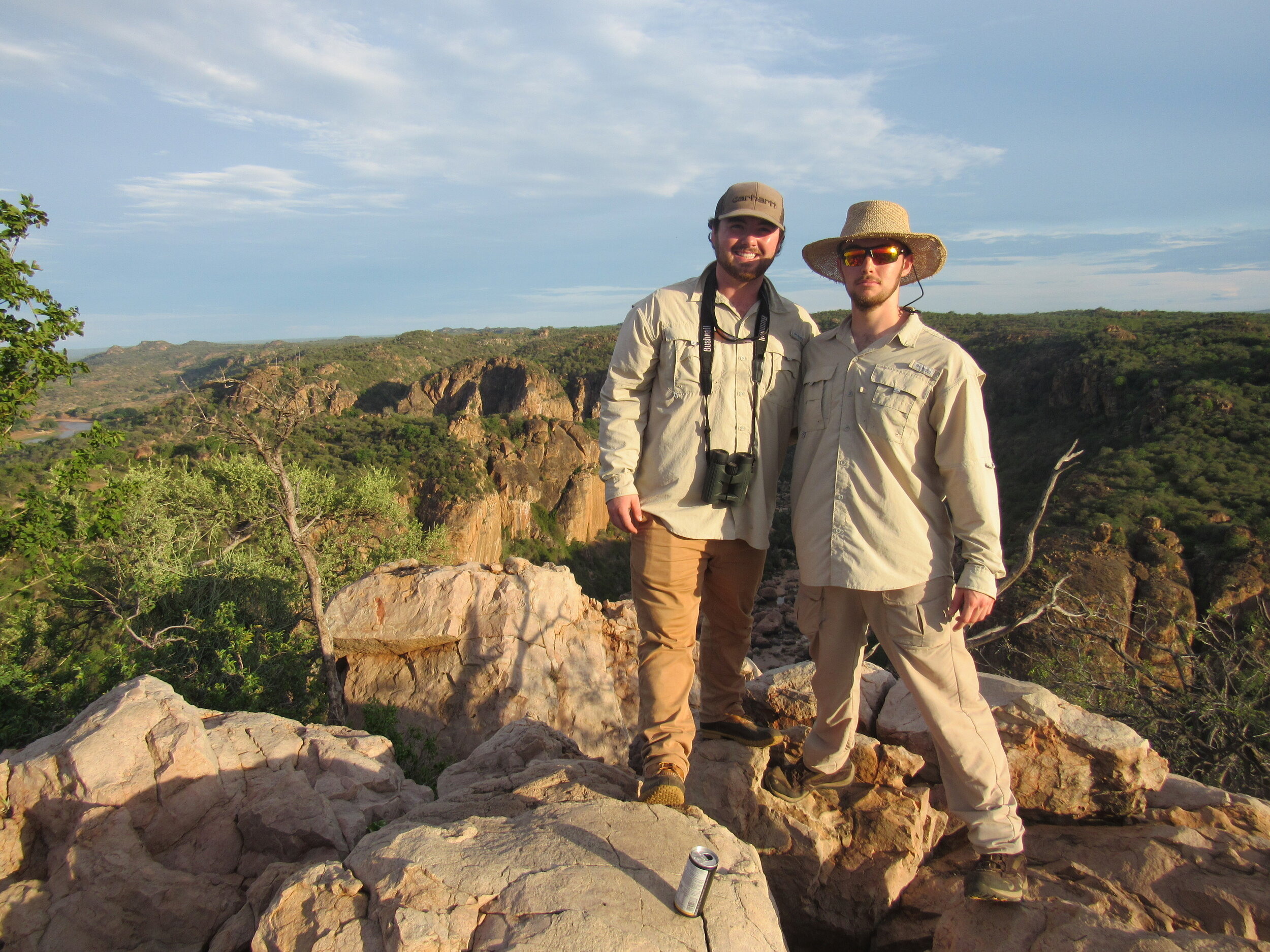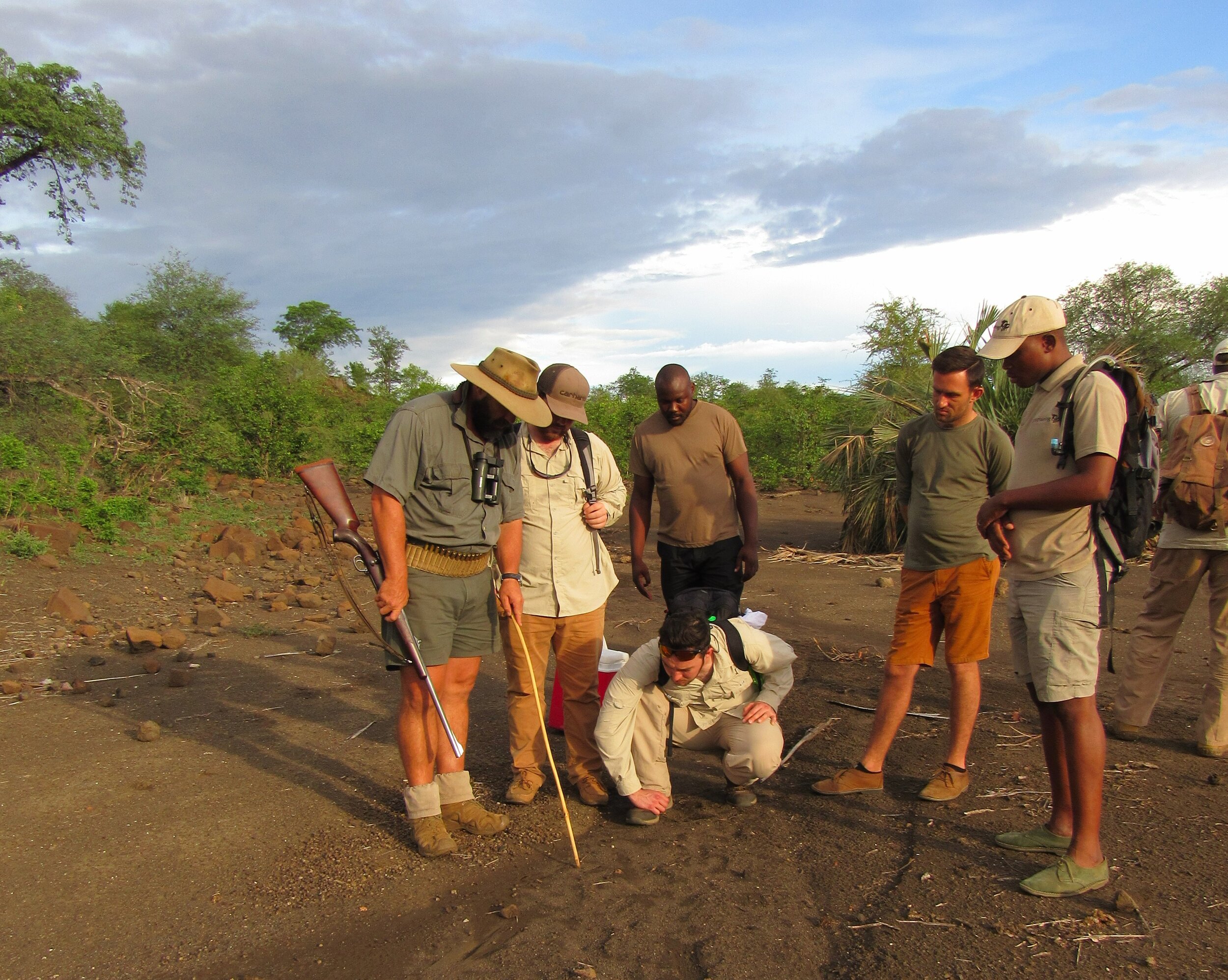Michael English
Cape Town, South Africa
The Bushwalk Experience
Ranger Dave stops ahead of us on the animal path that we are following. We huddle up behind him as he crouches down over a huge pile of dung. 'Can anyone guess what animal this is from?' he asks. 'Um, Elephant?' ventures one of the group members. 'Correct,' he replies, as he reaches out and plunges his finger deep into the pile. Ugh! Gross, what is he doing? ‘I can feel it’s still warm inside which means that it's from last night. Just a few hours ago, a large bull elephant walked down this path,' he announced to the group. 'Now, if you come over here you can see the tracks.'
Dave picks up a stick and traces the outline of the soft impression in the powder-soft sand of the track. 'Can any of you guess which way the elephant was going?' he asks the group. 'That way,' Theresa guessed, pointing down the track we were following. 'Actually, he was headed back the way we came away from the river,’ replied Dave. He proceeded to explain how the shape of the track allowed him to deduce the direction the animal went in.
Later, we stopped in front of a shrub that Dave explained was a bush toothbrush. We watched a Dung Beetle energetically rolling a ball of Elephant dung which it was going to lay its egg in. Dave brought bird calls to our attention and we peered among the vegetation to try and spot the birds that he pointed out – the man had the eyes of a Hawk!
Evening Walking Safari EcoTraining Kruger National Park ©Flyga Twiga™ LLC
benefits of taking a guided Safari walk
As the above anecdote illustrates, getting out of the Safari vehicle and heading out into the African bush is an immersive experience. All your senses get involved.
Listen to the sounds of the Cape Turtle Dove’s alarm calls.
Feel the long strands of the Elephant Grass run through your fingers.
Taste the Dew on a Marula Fruit.
Watch the smallest of critters in the bush. Termites collect grass and take it back to their impressive mud fortresses. Small Frogs leaping along the Bush.
Smell the fresh Elephant Dung.
Getting off the vehicle and walking allows you to reconnect with nature. It allows you to understand the complex symbiotic relationships between each plant, animal, and yourself. Most people come away from Bush Walks with a deeper appreciation of the African bush.
Nelsons Frog EcoTraining Makuleke Camp ©Flyga Twiga™ LLC
Types of bush walks
The guides pace the excursion according to the ability within the group. You may feel nervous about heading into the Bush. But, these walks are always done by experienced professionals who know the Safety Protocols. Listening to your Guides and Trackers talk about how you could survive out in the Bush, or telling tales of Animal Encounters, is always a rewarding experience.
Different Reserves and Camps will conduct walks in different ways according to the local regulations. You may head out first thing in the morning, or later in the Evening for a “Sundowner in the Bush”, but generally, they will take place in the cooler part of the day.
1) Kids Bush Walks
At many lodges there are “Mini Ranger Programs”. Here children are taken out on walks in areas where there is no dangerous Big Game Wildlife. The children can discover the secrets of the Bush. This experience often kindles their curiosity through making plaster of Paris moulds of animal tracks or looking at skulls of animals.
One such experience is the Tswalu Junior Ranger Programme. Located in the Kaluhari, “every child is welcomed with a backpack full of guides and tools.”
Children learn how much alike Animal Parents are to their own, protective and teaching the ways to Adulthood. Wherever the Kids Bush Walk, they always get a thrill learning about dung!
2) Nature Walks
Many lodges offer nature walks for adults too. These are not strenuous and allow you to encounter different species of antelope. The focus is more on Tracking, Birding, and the Flora and Fauna, which may be missed while in Game Drive Vehicles. These are a great way to learn about unique Plants and the Ecology of the region you are in.
3) Big 5 Bush Walks
Some private reserves in both southern and east Africa allow you to do a Walking Safari in areas where the Big Five (large more dangerous wildlife such as Lion, Buffalo, Elephant, Rhino and Leopard) occur. These walks are generally conducted with two Guides – one who will lead from the front and one at the back to ensure everyone’s safety. They will be armed with rifles should they need to protect the group, but they always use their knowledge to read animal behaviour and keep everyone safe
EcoTraining Tracking Pridelands South Africa ©Flyga Twiga™ LLC
The Safari Behind the Safari - EcoTraining
If you are looking for a more in-depth walking Safari Vacation, then you should sign up for one of the short courses offered by EcoTraining in the Makuleke concession in the Kruger National Park. Walking between 5 – 10km a day, courses focus on Wilderness Survival Skills, Animal Tracking, and Guiding. Weather permitting, you can even experience sleeping in the Bush - out under the stars. This is a truly immersive bush experience which will leave you with a new appreciation for the natural wonders of Africa.
Please feel free to contact us if you would like to create your unique EcoTraining Experience.
Walking Safari EcoTraining Makuleke Camp ©Flyga Twiga™ LLC





